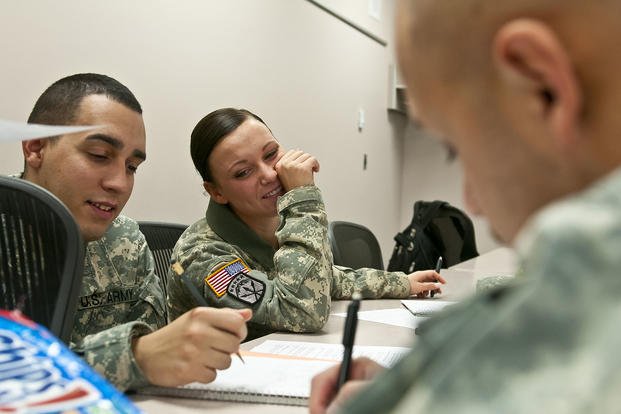As with any test, how well you do depends in large part upon how well you prepare. To study effectively for the ASVAB, you really need to begin studying at least two months before you plan to take the test, if not more!
Here are some basic steps to take:
- Find a comfortable, quiet area to study.
- Gather paper, pens and pencils, a calculator and other tools.
- Make a basic study schedule.
Make a Study Schedule
Probably the most important thing is to make a schedule and stick with it. Some days, you will be a little tired, and you may not concentrate as hard as you should on other days, but if you are consistent, you will reap great rewards.
When you first begin studying, you should make a list of the areas you are good at and those on which you could use improvement.
If you're not really sure, it would be a great idea to take a practice ASVAB test.
Related: Take an ASVAB practice test
This will help you figure out what you're good and not so good at. For example, you might make a table like this:
| Section | Current Skill Level Scale of 1 - 5: 1 = Low 5 = High |
| AFQT Sections | |
| Arithmetic reasoning (AR) | 3 |
| Mathematics knowledge (MK) | 2 |
| Word knowledge (WK) | 4 |
| Paragraph comprehension (PC) | 3 |
| Extra Sections | |
| General science (GS) | 5 |
| Auto and shop information (AS) | 2 |
| Mechanical comprehension (MC) | 1 |
| Electronics information (EI) | 3 |
Why Focus on the AFQT sections?
The Armed Forces Qualification Test (AFQT) score is a subsection of your overall ASVAB score. While your overall ASVAB score determines the Military Occupational Specialties (MOS) for which you qualify, your AFQT score is even more important. That’s because how you score on the AFQT determines whether you qualify to join the military at all. The minimum required AFQT score depends on which branch you want to join. For example, the Army requires a minimum AFQT score of 31, while the Coast Guard requires a 36.
Focus on Your Weaknesses
Focus on the four essential sections, those critical to the AFQT score, first. From the example above, it seems that your verbal abilities are at least OK: you gave yourself a four on the word knowledge section and a three on paragraph comprehension. However, your math skills could use some work -- especially with mathematics knowledge, as you only have a skill level of two. This tells you that you'll have to work extra hard on the math sections.
After you know the problem, the solution will come much easier. In the example above, you probably would want to spend about 60% of your time with math studying and about 40% with verbal. If you are really ambitious, you could throw in some studying time for the nonessential sections -- GS, AS, MC, EI. An hour-a-day study schedule might look something like this:
| Day | Time | Sections to Study |
| Monday | 7-8 p.m. | Mathematics knowledge |
| Tuesday | 7-7:30 p.m. 7:30-8 p.m. | Arithmetic reasoning Paragraph comprehension |
| Wednesday | 7-7:30 p.m. 7:30-8 p.m. | Mathematics knowledge Word knowledge |
| Thursday | 7-8 p.m. | Mathematics knowledge |
| Friday | 7-7:30 p.m. 7:30-8 p.m. | "Extra" section (GS, AS, MC, or EI) Paragraph comprehension |
| Saturday | No studying -- Read a book to help boost vocabulary! | |
| Sunday | 7-8 p.m. | Review any trouble spots you had. Maybe take a practice test to see how you've improved! |
What's the most important day out of the above? Hands down, Sunday. Review is essential if you want to make progress. If you never review what you've done, how will you know whether or not you've improved?
"We know from our many years offering ASVAB test prep courses that studying and practicing are essential to getting a good score. Since your score determines the military career path opportunities you may have, it's worth it to put the time and energy into getting ready for the test." said Elizabeth Barry, director of marketing for Peterson's Test Prep, a leading test prep provider.
Though you may be intimidated by studying 5-7 nights a week, remember that this is only for a few months. The investment you make now in yourself can have great rewards -- if you put in the time! Just be honest with yourself, find out what you need to work on the most and stick with your schedule. You also may want to set goals, such as: "I want to take a practice test and score 80% or better on it within a month." However you choose to study, be consistent, be confident and you will be successful!
General Study Tip: Developing good study habits is key for lifelong achievement and not just testing.
Interested in Joining the Military?
We can put you in touch with recruiters from the different military branches. Learn about the benefits of serving your country, paying for school, military career paths, and more: sign up now and hear from a recruiter near you.
Military.com may receive compensation from service branches of the Department of Defense for providing a form on site for those interested in being contacted by a recruiter.






